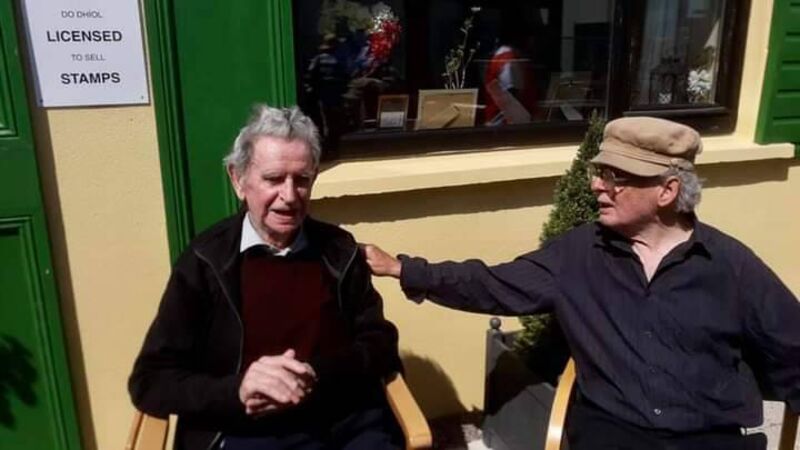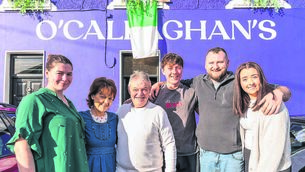Teacher, pub landlord, music-lover: My tribute to Dick Tobin

Jimmy Crowley (right) with Dick Tobin, who was laid to rest this week
THEY stand like phantom sentinels in the opera of our lives. And long after they pass over, they shine on, continuing to impart their wisdom to us, maybe bidding us to reconsider here, putting us right there, on many a conundrum, unwrinkling many a dilemma. They are, of course, if we are lucky enough to have acknowledged them, the catalysts of our life.
One of the brightest of mine was laid to rest on Wednesday last. Risteárd Tobin, or Dick Tobin as his friends called him was quickly nicknamed ‘Elvis’ in the tough, brand-new boys secondary at the top of Capwell Road called Coláiste Chríost Rí.
Young Mr Tobin, when I joined as a pupil in ’64, was probably in his early twenties with a shock of raven hair that would put Elvis to shame. He could rattle off Latin like a cardinal; I had the misfortune to have him for Maths, which I never believed in. My conception of mathematics after the initial buoyancy and advantage that attended most Douglas boys who had ‘gone through’ Mr O’ Donovan’s advanced mathematics soon began to show cracks as Dick danced us, as Gaeilge, if you please, through some pretty flash conceptions released on an innocent world by Messers Pythagoras ,Euclid and Hipparchus.
Wearing glasses, I very conveniently avoided all contact games; though contact with the leather and cane at regular intervals was inevitable. Dick Tobin didn’t seem to need such excesses. He evinced a ready respect from students upon his entry to a class-room; though ’twas rumoured that he carried a deadly wire in his pocket. This heavy-grade, high voltage blue hawser by reputation was never seen by me in action, Deo gratias.
But I did see Dick’s great passion for Gaelic football and hurling. He seemed to be heart and soul in all the inter-college matches; in Harty Cup clashes where Coláiste Chríost Rí displayed fine records. He trained teams inexorably, putting great passion behind everything he did sports-wise, and I can still feel the ambrosia and pride of those innocent days.
One day, in between times, Dick opened up about music; about Irish culture and its context in the modern world. I had just been seduced by George Harrison’s twangy incongruous opening chord which introduced A Hard Day’s Night so it must have been ’64. In a few sentences Mr Tobin drew the componets together; the landscape, the heart-rending melody of Mo Mhuirnín Bán and he predicted at some stage ahead, perhaps as broken-hearted emigrants, all this would make sense to us and we’d see then the power and importance of dúchas.
I left CCR all too soon to go cabinet-making. Years later, when Dick found out I scraped a little on the fiddle, he invited me out to some shady brigeen in his native Déise to meet box player Micky Dalton, Quinn (the mad blacksmith) on bodhrán and characters from a different world who made an indelible effect on me. Years of fun in Dick’s powder-blue VW Variant station wagon followed. As chairman of Comhaltas Ceoltóirí Éireann, he promised he’d open up the weekly session to the people of Cork, allow ’em to have a few pints, and what followed was a golden epoch of charmed Friday nights at the Country Club Hotel.
Dick became colourful landlord of The Gables public house in Douglas Street later in his life and the sessions from its taproom are legendary. He had a particular grá for The Goat; his favourite Cork song, and I’m dedicating it to his gentle, noble memory. Ar dheis Dé go raibh a anam.
Now Paddy Mc Ginty bought a house outside in Sunday’s Well,
Contagious to the north side of the Lee.
He lived all alone in his cosy little home,
So he bought a goat to keep him company.
Now, says Paddy to the goat, ‘For you I’ll buy a coat
And a visit to Cork city we will pay.’
But the goat kicked up a mountain when he saw the Berwick Fountain,
On the night the goat broke loose on the Grand Parade.
On the night the goat broke loose on Grand Parade,
All the people in Cork city got afraid,
For the shout went through the county
That the Barrs had won the County,
On the night the goat broke loose on Grand Parade.
There’s a girl called Lily Warner she came from Punch’s corner,
Swore she’d go to Dublin ere she died.
But the goat came up behind her and gave her such a winder,
That she hadn’t time to bid her friends goodbye.
Then Mary Anne Fitzgibbon got her drawers all torn to ribbons
And she heading for the Munster Arcade;
It was a sad bereavement when he tumbled her on the pavement
On the night the goat broke loose on the Grand Parade.
On the night the goat broke loose on Grand Parade
All the soldiers in Cork city got afraid.
They came tearin’ down through Pana with a hold on their banana,
On the night the goat broke loose on Grand Parade.
Now the people up in Barrack Street when they heard the dreadful news,
They swore out in vengeance what they’d do;
They lined the streets in batches all armed with hammers and hatches;
But when the goat appeared they all withdrew.
The goat came round the corner and he thundering like a cannon,
Pursued by the Cork city fire brigade;
When he reached the South Gate Pier, he dived into the weir
And was never seen again on Grand Parade.
On the night the goat broke loose on Grand Parade,
All the people in Cork city got afraid.
Katty Barry and Kate Kearney got a sidecar out to Blarney
On the night the goat broke loose upon the Parade.







 App?
App?


